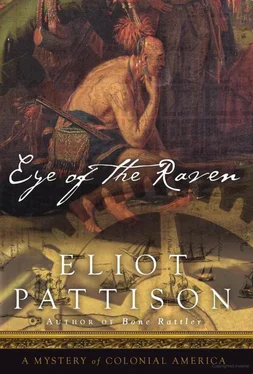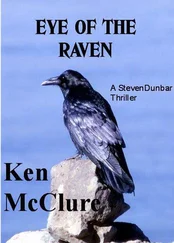Eliot Pattison - Eye of the Raven
Здесь есть возможность читать онлайн «Eliot Pattison - Eye of the Raven» весь текст электронной книги совершенно бесплатно (целиком полную версию без сокращений). В некоторых случаях можно слушать аудио, скачать через торрент в формате fb2 и присутствует краткое содержание. Год выпуска: 2010, ISBN: 2010, Издательство: Counterpoint Press, Жанр: Исторический детектив, на английском языке. Описание произведения, (предисловие) а так же отзывы посетителей доступны на портале библиотеки ЛибКат.
- Название:Eye of the Raven
- Автор:
- Издательство:Counterpoint Press
- Жанр:
- Год:2010
- ISBN:9781582437019
- Рейтинг книги:5 / 5. Голосов: 1
-
Избранное:Добавить в избранное
- Отзывы:
-
Ваша оценка:
- 100
- 1
- 2
- 3
- 4
- 5
Eye of the Raven: краткое содержание, описание и аннотация
Предлагаем к чтению аннотацию, описание, краткое содержание или предисловие (зависит от того, что написал сам автор книги «Eye of the Raven»). Если вы не нашли необходимую информацию о книге — напишите в комментариях, мы постараемся отыскать её.
Eye of the Raven — читать онлайн бесплатно полную книгу (весь текст) целиком
Ниже представлен текст книги, разбитый по страницам. Система сохранения места последней прочитанной страницы, позволяет с удобством читать онлайн бесплатно книгу «Eye of the Raven», без необходимости каждый раз заново искать на чём Вы остановились. Поставьте закладку, и сможете в любой момент перейти на страницу, на которой закончили чтение.
Интервал:
Закладка:
"I feel it, yes. But it is a busy river. I could be mistaken."
"The killer has only struck on the Warriors Path," Duncan reminded his friend.
"The killer," Conawago countered, "makes ritual murders on the trail. Off the trail he may not need to be so fastidious."
By the time they landed below Shamokin the next morning, Mokie had repeated, without Duncan's bidding, what she and her mother had been instructed to do were they to reach the Indian town alive. Find the trail that rose above the southern edge of the town, they'd been told, and go to the fort that was not a fort, then ask again for the great bear.
"Was it Captain Burke who gave you those instructions?" he asked.
"On a piece of paper from Captain Burke," the girl confirmed. "We had to burn it after, he said. Captain Burke, and Mr. Hadley, they teach mama and me how to read and write. Captain Burke, he would say that he would see we would always have jobs in the house, not out in the weather."
"Why, then," Duncan asked, "did he change his mind? What made him help you flee?"
"Don't know. We couldn't make the sense of it. He just took us into the summer kitchen and said we deserved better, that he had a way to help us, help everyone. Mama made him swear on a Bible he was not tricking us."
"Help everyone? What did he mean by that?"
But the child only shrugged.
As Van Grut and Hadley disembarked, Duncan stood on the bank and stared with foreboding in the direction of the settlement, its existence marked by the many plumes of smoke rising over the low ridge before him. In English he recited Mokie's instructions for all to hear. The declaration brought a stifled laugh from Johantry, who translated it for his companions, raising more laughter.
"Do you know this bear?" Duncan asked.
Johantty raised a hand and pointed further down the ridge. "The bear's den is on the ridge," the young Iroquois declared then, exhausted, curled up for sleep on a bed of moss.
Duncan had been to Iroquois villages with Conawago, and at Shamokin expected something similar, on a larger scale, long bark houses with fields of corn, squash, and pumpkins stretching out from them. But it was no metropolis of longhouses he saw as they crested the ridge. The town seemed to consist of pieces borrowed from several different communities, haphazardly jammed together. Close to the river, on the long, curving flat at the junction of the north and west branches, there were indeed several longhouses, though half appeared abandoned. Here and there were clusters of log cabins, connected by muddy byways and most surrounded by primitive snake-rail fences that kept in milk cows. Scattered about were more prosperous-looking cabins, with even a few substantial stone houses standing out amid rich fields of bottomland. A small stone church stood by a graveyard. Beyond everything, just above the fork, was a log palisade structure, the fort used by the militia.
The hammer of a smithy by the river rang out, near which several men labored over a new bargelike vessel resting in a log trestle. Kegs were being rolled from one of the heavy cargo canoes that plied the river. Duncan watched their progress, spying a substantial cabin against which more kegs were stacked. A tavern. Two familiar figures emerged from the trees and walked toward the church. Van Grut and Hadley had agreed to explore the town as Duncan and Conawago escorted Mokie to her mysterious rendezvous.
When he first looked down on the compound below the laurel thickets, Duncan thought they had found another military fort, then saw that the structures were old and in disrepair, placed not for defense of the river forks but more for a view of the town. As he approached he saw that not all was tumbledown. The central gate had been recently rebuilt, and the dominant building appeared to have been created by constructing a hall against an older structure with the appearance of a church. Years earlier, he suspected, the compound had been built as a mission. Now it was alive with industry, men in buckskins and breechcloths counting and tying furs in bundles, others operating one of the heavy wood-screw presses used to compress stacks of hides for shipment. Several Indian women were hanging fish on long drying racks. On the wall of the new construction he saw a huge bearskin. Fighting a fresh foreboding, wishing he had not left his gun at the landing place, Duncan turned to tell Mokie to remain with Conawago while he explored further. But she was gone. He looked frantically about and spied her running through the open gate with Conawago trotting to catch up with her.
He nearly collided with his friend as he darted through the gate moments later. Conawago was frozen, staring at a huge device made of wood, leather, and bone. It was spinning about, propelling several Indians in a circle as they sat on short planks suspended on ropes. Duncan gazed in disbelief at the machine, which was built around a heavy wagon wheel mounted horizontally atop a thick post functioning as an axle. Extension poles had been strapped with leather to the spokes of the wheel and hung with the rope swings at their ends. Antlers and small skulls adorned the end of the poles. Impossibly, it was a carousel, a particularly Indian carousel. Three small Indian children swung with cries of glee as an older Indian man propelled the machine by pulling on a rope hung from one of the extension poles. Two adolescent girls and a woman sat on the other seats, making no sound, their eyes filled with wonder.
A shriek from inside the large building broke their spell. Duncan and Conawago darted inside, past a sleepy Indian propped on a keg beside the door who sounded a surprised, halfhearted warning at their sudden appearance. Conawago's hand was on his warclub, Duncan's on his tomahawk, as they sprang into a large chamber.
They were met by high-pitched laughter. It took a moment for Duncan to realize that it came from Mokie, pointing at them in amusement, as if they were performing on her behalf. She sat at a long table eating bread and honey off a wooden plate beside a man with a great black beard. With one foot on the bench beside the girl, he was tuning a fiddle.
The stranger began a lively reel, bowing in greeting without stopping his music. He leaned over Mokie, playing with great speed and skill, finishing with a flourish and a hearty laugh that shook his well-fed frame. He nodded his head toward his two new guests. "The mademoiselle has her first sweet taste of liberty. Surely worthy of a celebration."
"It looks like only bread and honey to me," Duncan observed.
"The plantation masters are far away," the man replied, stiffening. "The mountains are high."
"You are French," Duncan said, at once embarrassed by the unnecessary observation but unable to hide his surprise.
"A label bestowed by birth is impossible to deny." The man pushed the pot of honey closer to Mokie.
Conawago paced about the long table, eyeing the man with the same distrust Duncan felt. He paused at the only refined piece of furniture in the chamber, a little cherry table on which sat a solitary cross and a Bible. In the dust on the table he drew two letters with his fingertip. An S and a J.
The Frenchman's smile dimmed for a moment. He stepped to the table and erased the marks with a sweep of his hand. "That particular label I was able to abandon."
"For the profits of a merchant," Conawago shot back.
Duncan looked from man to man, unable to grasp what was passing between them.
"I came into the wilderness to aid the last uncorrupted people on earth."
"I believe the doctrine says we all are corrupted," said Conawago.
"That doctrine was devised by arthritic old men in Europe who never walked in the bowers of Eden." The man had grown serious, almost somber. "Sault St. Louis?" he asked of Conawago. "Swegatchy?"
Читать дальшеИнтервал:
Закладка:
Похожие книги на «Eye of the Raven»
Представляем Вашему вниманию похожие книги на «Eye of the Raven» списком для выбора. Мы отобрали схожую по названию и смыслу литературу в надежде предоставить читателям больше вариантов отыскать новые, интересные, ещё непрочитанные произведения.
Обсуждение, отзывы о книге «Eye of the Raven» и просто собственные мнения читателей. Оставьте ваши комментарии, напишите, что Вы думаете о произведении, его смысле или главных героях. Укажите что конкретно понравилось, а что нет, и почему Вы так считаете.












